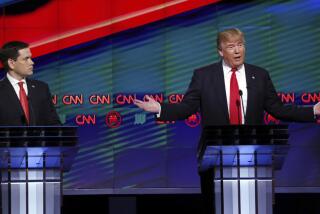Cuba’s apparent successor to Castro was carefully groomed
- Share via
MEXICO CITY — To most outsiders, Miguel Diaz-Canel was an unknown. But in Cuba, the newly anointed possible heir to the Castro brothers was a carefully groomed, hardworking and familiar figure.
Diaz-Canel emerged as the likely successor to lead a post-Castro government over the weekend when he was named first vice president and President Raul Castro announced that he would step down at the end of his just-ratified five-year term.
It marks the first time an expiration date has been put on the Castro era, during which the island was led first by Fidel and then by Raul after the 1959 revolution that ousted a dictatorial U.S.-backed regime.
Diaz-Canel, 52, is part of a new generation of Cuban political operatives. Raul is 81 and Fidel, who formally stepped down in 2008, is 86.
The heir apparent worked his way up through the ranks of communist Cuba, serving in the military and filling posts in the provinces. He won praise from the leadership for fidelity and a roll-up-the-sleeves work ethic that put him in the trenches alongside regular people.
“He is not a test-tube politician,” said a Cuban official who spoke on condition of anonymity because he was not authorized to discuss political matters. In other words, he was not a latecomer dilettante who felt entitled by virtue of class or family. “He worked closely with the people and gained lots of experience.”
Essentially, he paid his dues, putting hard work ahead of the overt ambition that has felled many an up-and-comer on the Cuban political landscape.
Tall, with thick silvery hair, Diaz-Canel is a striking if not particularly charismatic figure. In nearly three decades of work on behalf of the state, he earned a degree in engineering, taught at the university level, ran local governments and dipped his toe into international tourism. He was assigned management of what Cuban officials consider major areas of accomplishment by the revolution: education, sports and biotechnology.
“His legitimacy comes from governing and doing,” said Julia E. Sweig, an expert on Cuba at the Council on Foreign Relations and author of the book “Cuba: What Everyone Needs to Know.” “He is a problem-solver and very grass-roots. He comes from real on-the-ground actions.”
More recently, as his profile rose and his appearances on Cuban television increased, he filled in for Raul Castro at important events, including a symbolic inauguration of the cancer-stricken President Hugo Chavez of Venezuela, Cuba’s most important ally. He also attended the swearing-in of Mexican President Enrique Peña Nieto at a time when Cuba is hoping to restore its formerly close relationship with the country.
Raul Castro himself sang Diaz-Canel’s praises Sunday after the appointment. “He is not an out-of-nowhere [figure] nor an upstart,” Castro said, and went on to detail the younger man’s 30-year career.
Castro said Diaz-Canel’s appointment represented a historic point in a generational transformation.
Of course, this is Cuba and many things could yet derail the career of Diaz-Canel. If he does succeed Castro, the task before him is enormous. Castro has embarked on a slow but steady program of reform, loosening the state’s grip on the economy and opening travel for citizens — steps, he says, that were necessary not to do away with the country’s socialist model but to modernize and improve it. Yet it is a painful and uncertain period for a population mostly reared by a paternalistic state.
Castro apparently trusts Diaz-Canel as a figure of continuity. That may reassure members of the government, but it riles the exile community that is hoping for more definitive change.
“Shifting the deck chairs on the sinking Titanic won’t produce positive changes,” Havana-born U.S. Rep. Ileana Ros-Lehtinen (R-Fla.) said in a statement.
It is probably Diaz-Canel’s military experience, along with his years of Communist Party duty, that make him most trustworthy to Castro. He served in an antiaircraft rocket battery in his youth and is believed to maintain good contacts with the armed forces.
“He clearly supports the economic opening and is trusted by the party and the military, and these are the principal pillars of government at this time,” said Robert A. Pastor, director of the Center for North American Studies at American University in Washington and a former Carter administration official involved in Cuba.
“The naming of Diaz-Canel is a further sign that the transition — from caudillo rule to cautious institutionalization of the revolution, from a closed state-controlled economy to one that is opening gradually — is well underway, and the Communist Party is firmly in control.”
More to Read
Sign up for Essential California
The most important California stories and recommendations in your inbox every morning.
You may occasionally receive promotional content from the Los Angeles Times.











